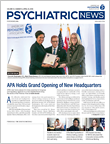Last month’s March for Our Lives had a special meaning for many of us. My sister is a teacher who once taught at a high school in Florida near Parkland; she knows the passion and single-mindedness these students bring to the issues they care about and has every confidence in their ability to organize and sustain a movement. She and her daughter and my daughter joined in the march in Washington, D.C., to support this youth-led movement to reduce gun violence. As a psychiatrist who has practiced in Baltimore for the last 10 years, including during the riots associated with the death of Freddie Gray, I particularly appreciated that march participants addressed various types of violence impacting our country today.
As is often the case with complex problems, a set of solutions are needed that can act together to reduce injuries from violence involving guns, assault, or other means. One example of a successful approach to reduce the recurrence of violent injuries is the San Francisco Wraparound Project. This program, now run by Dr. Catherine Juillard, was conceived by Dr. Rochelle Dicker, a trauma surgeon who was frustrated that the patients she treated often returned to her trauma center after experiencing yet another traumatic event. I first learned about the Wraparound program from a student in Baltimore, Dr. Adaobi Nwabuo. Adaobi, who is a native of Nigeria, is the injury prevention coordinator at Zuckerberg San Francisco General Hospital (SFGH) and works with the Wraparound Project. I met her while she was working on her M.P.H. at the Johns Hopkins Bloomberg School of Public Health. Here is Adaobi’s account of the Wraparound program:
Homicides are the third-leading cause of death among all people aged 15 to 34 in the United States, and previous violent injury is one of the strongest risk factors for a subsequent violent injury; up to 35 percent of injured patients in the U.S. experience a subsequent injury within one year. The Wraparound Project (Wraparound) is a hospital-based violence intervention program that aims to stop the revolving door of violent injuries in San Francisco. Wraparound is based on the public health model of violence prevention, which asserts that violence can be prevented by addressing underlying risk factors. Case managers at Wraparound connect with individuals just after their injury—that is, during a “teachable moment”—and provide them with resources to prevent further injury.
Wraparound is both effective and cost-effective. Since the project’s inception in 2005, re-injury rates at SFGH have decreased from 8 percent to 4 percent. Additionally, if implemented for 100 individuals, it results in cost savings of $4,100 and an increase of quality-adjusted life years by 24. Wraparound has served over 700 victims of violent injury, the majority of whom are African American (73 percent) and between the ages of 18 and 35 (89.43 percent). Mental health services, housing, and employment have been the most frequently identified needs of clients, and case managers have addressed 74 percent, 61 percent, and 60 percent of those needs, respectively. Overall, the Wraparound Project has addressed 67 percent of all identified needs.
Wraparound provides a wide range of services, either in-house or in collaboration with our community partners. The services we offer include mental health care, housing, employment/job readiness, court advocacy, and education. Wraparound partners with organizations such as the Trauma Recovery Center for mental health services, Friends of the Urban Forest for employment, and Project Rebound for education.
There is also a strong relationship with city groups such as the District Attorney’s office, Department of Public Health, and the Street Violence Intervention Program. These relationships allow Wraparound not only to provide services to our clients but also to advocate for them at the city level.
Wraparound’s case managers are extremely community focused. As residents of San Francisco with personal and professional experience of dealing with violent injury, our case managers are vested in improving their communities. Through programs such as the Art Workshop and Weapons in Minors’ Possession program, Wraparound reaches out to community members even before they are injured, further cementing the relationship between SFGH and the community.
Wraparound is a founding member of the National Network of Hospital-Based Violence Intervention Programs, which now includes over 35 programs in the United States, Canada, and the United Kingdom. Wraparound’s model has been successfully replicated by many sites, and it mentors fledgling programs. Wraparound also plays an integral role in advocacy such as the drive to make the inclusion of a hospital-based violence intervention program a requirement for trauma centers.
Wraparound is also conducting valuable research projects including the development of a risk assessment tool to allow less experienced case managers to screen victims of injury and assess their risk of re-injury; the measurement of long-term outcomes to assess and quantify the long-term benefits of Wraparound as well as the impact of trauma-informed care on re-injury; the identification of predictors of mental health utilization among victims of trauma; and the study of the effects of childhood trauma on injury recidivism. These projects are geared toward measuring outcomes beyond re-injury because Wraparound’s work goes beyond keeping people from getting injured; it strives to make communities happier, healthier, and more productive.
Violence is everybody’s problem in our culture, and we all need to be engaged in some way in working toward its reduction. Many of us hope that the kids from Parkland and across the United States, as well as the adults who are standing with them, are successful in their endeavor to reduce violence and its long-term impacts. ■

